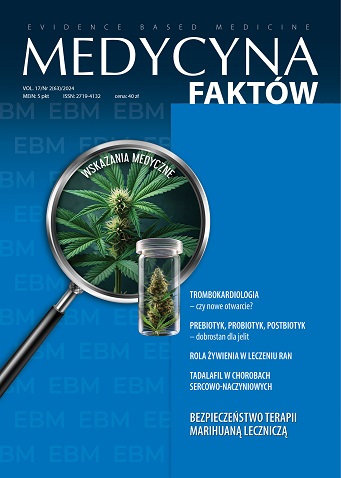The problem of pharmacokinetic resistance to ASA Commentary
Main Article Content
Abstract
Acetylsalicylic acid (ASA) is the basic antiplatelet drug, however, disruption of pharmacokinetic processes at the absorption stage may lead to pharmacokinetic resistance to ASA. This results in incomplete inhibition of aggregation and an increased risk of cardiovascular events. The phenomenon of resistance more often affects obese, diabetic or elderly patients. One of the possibilities to overcome pharmacokinetic resistance may be the use of an immediate-release tablet and the addition of substances that accelerate absorption, such as glycine. Glycine also has anti-inflammatory, immunomodulatory and cytoprotective effects, which may limit gastrointestinal damage associated with ASA therapy. Clinical trials indicate that glycine supplementation may reduce the risk of cardiovascular disease in patients with metabolic syndrome. Therefore, in geriatric, obese or diabetic people, the use of immediate-release formulations with the addition of glycine may prove to be an effective antiplatelet treatment option.
Article Details
Copyright by Medical Education. All rights reserved.
References
2. Khan H, Kanny O, Syed M et al. Aspirin Resistance in Vascular Disease: A Review Highlighting the Critical Need for Improved Point-of-Care Testing and Personalized Therapy. Int J Mol Sci. 2022; 23: 11317.
3. Grimaldi R, Bisi M, Lonni E et al. Laboratory aspirin resistance reversibility in diabetic patients: a pilot study using different pharmaceutical formulations. Cardiovasc Drugs Ther. 2014; 28(4): 323-9.
4. Du G, Lin Q, Wang J. A brief review on the mechanisms of aspirin resistance. Int J Cardiol. 2016; 220: 21-6.
5. Morton M, Kubiak-Balcerewicz K, Sarnowska A et al. Biochemical aspirin resistance in acute stroke patients and its association with clinical factors: a prospective pilot study. Folia Neuropathol. 2021; 59(3): 271-5.
6. Zhang H, Chen X, Liu L et al. High prevalence of aspirin resistance in elderly patients with cardiovascular disease (CVD) and hyperhomocysteinaemia. Arch Gerontol Geriatr. 2014; 59(2): 491-5.
7. Murtaza G, Karim S, Najam-Ul-Haq M et al. Interaction analysis of aspirin witch selective amino acids. Acta Poloniae Pharmaceutica - Drug Research. 2014; 71(1): 139-43.
8. Zhong Z, Wheeler MD, Li X et al. L-Glycine: a novel antiinflammatory, immunomodulatory, and cytoprotective agent. Curr Opin Clin Nutr Metab Care. 2003; 6: 229-40.
9. Imenshahidi M, Hossenzadeh H. Effects of glycine on metabolic syndrome components: a review. J Endocrinol Invest. 2022; 45(5): 927-39.

